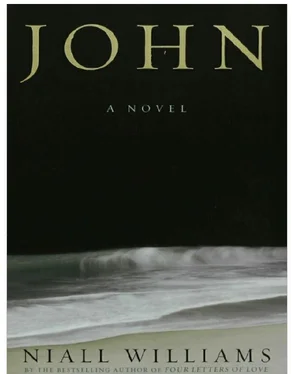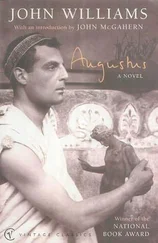'You should tell him, Papias, that if he must come, we will bear him above us.'
The Apostle is seated outside the doorway, his face to the morning light. The habits of his life on the island remain with him. His robe has been washed by Martha and all but shines whitely.
'Master?'
'What troubles you, Papias?'
'It is thought the city is too dangerous.'
'I am come not to stay hidden. I go into Ephesus to begin to prepare the way.'
'I have told that you would not remain here. Danil says that we bear you on a litter, or a chair shouldered between us.'
John smiles. 'Go, tell that they must not fear. I will walk. And I will come to no harm.'
Papias has known this would be the answer. He turns to bring the news inside when John says, 'Papias, the boy Kester did not return with you?'
The disciple pauses on the precipice of truth. 'He went away from me in the street,' he says. 'I could not find him after. I thought he would be returned here. But he is not come back.'
The old man nods slightly, says nothing.
They leave the house soon after in small phalanx, Papias and the Apostle at the rear. The day is already hot, the merchants and traders already installed. They come the narrow streets slowly.
Some standing in conversation, or idling in shadow, take notice of the thin figure robed in white, his long wisp hair, his blind eyes. What new sage is this? What soothsayer? Where will he set up? Perhaps he can read fortunes. Look, already he has followers.
The disciples head toward the open square of the State Agora and the basilica. Short, tense, Danil squares his chest, leads at the front. Noise of voices, cries of exchange and barter, of prices, weights, matters mercantile, swells the streets. Goods of all kind are borne to and fro. In his blindness, what must the Apostle think? He is as one bearing a candle flame. What readiness he might have to meet the jostle of the traders is nothing to what he needs next when they are arrived at the square. For here, in clusters tight and disparate, are gathered preachers, mentors, masters and followers, domini of varied belief. Here the trade is creeds, and the stock measured in disciples. Men call out for custom, promise reward, promise the favour of God, promise a place at the right hand. Some, in extravagant dress with red sash, with purple stole, or covering of snakeskin, make high drama, dance steps, drumbeat. All is clamour. All seek the attention of each passerby, make urgent claim of knowledge. Here seem assembled all those who interlocute between man and God, who have been variously touched by light, by fire, by vision. As the disciples move among them, their sleeves are pulled by youths in day employ to bring listeners.
'Come, come hither, listen to my master. Save your soul.'
'Here, hear the great Athos. Hear the salvation of the world.'
'Do not touch us, let go.' Lemuel spins back to see a youth try to drag the blind apostle to where a number of men stand in brown robes. With two hands Papias knocks the youth forcefully back.
'Stop! Stand back. Do not touch him!'
'Come, come to hear the word of John,' the youth says, and points.
'Of John?' Papias asks, startled.
'Of John, yes, John, come,' the youth nods.
And the Apostle and the disciples move across to stand then in stunned amaze and listen.
'Learn of the water of life,' cries one of the men. 'Unless you be baptised of the water of life you cannot enter to the kingdom of God.'
A man, wizened, gum-shrunk, approaches, upon his cheek a constellation of sores.
'All can be saved and given eternal life in the name of John the Messiah.'
'John was not the Messiah!' Lemuel cries. The crowd stirs about to consider him. But the baptiser is not deterred; he is used to all manner of objection, the goldsmiths have decried him, all and sundry.
'Yes, John was the Messiah. John came from God,' he calls down, 'came from the right hand of God to show the way to heaven. In his ministry here on earth he performed many miracles. Made the blind to see, the lame to walk. Often in the waters of the Jordan came healing, came salvation thanks to John.'
The old man drops to his knees. The crowd that has gathered presses forwards. Some who have been attending less dramatic presentations hurry over for the spectacle. Something may happen. You never know the hour. The sun burns hotly. There is brilliance of white light.
'John was not the Messiah!' Lemuel cries once more. 'John came before. To bear witness. He was sent by God to bear witness to the light that was to come.'
There are murmurs and the crowd presses to see, a swathe of sun-browned faces and dark beards. Is there to be a fight? Which tells the truth? Will they wrestle each other for victory of God?
The disciple is prepared to elbow forwards to further argue, but John says, 'Lemuel, come away.'
The Apostle turns and tells Papias to lead them to a quieter place in the square.
'Come back and find salvation!' the baptiser exhorts.
The disciples in a loosened knot slip back from the crowd. Some shake their heads at them for cowardice or remaining unclean of spirit. Then another has stepped forwards to be baptised and takes all attention.
In the square there are everywhere islands of proclaimers, about them small gatherings that stand and disperse as interest or boredom decide. Here are loud hollerers, ones who beat their chests across with thorned sticks and cry out to the blue sky, here others in heavy chains, so long worn as to have enwreathed the flesh with running calluses, red and purple and yellow. So, too, are small assemblies in attendance to doctrines obscure, prophets from distant lands whose names are unfamiliar but were, too, emissaries of God. There are desert gods, mountain gods, river gods, gods of rain, gods of particular places, particular months, days. Gods who demand sacrifice, payment, service. At one larger gathering there is proclaimed a great god of insects; those who would be his disciples may take inside them the very body and spirit of their god who is come on earth in the low form of beetles, centipedes, such. A man with great wool of hair and whiter-than-white of eye blears about, chants in tongues, then dips his hand into a timber bucket and draws from it the long wriggling body of a horned insect. Fine black antennae twist in the air. 'Take inside you the body and spirit of God!' he cries out, then opens wide his mouth and drops the insect inside. There is chorus of mixed admiration and revulsion both. He chews roundly, shuts his eyes, and intones some manner of prayer.
'Come, partake of the body of God. Eat and be made holy!'
The disciples move on. The crowds flow fickle, this way and that; about their edge, with condemnatory regard, those passing to and from the synagogue. See what happens, they seem to say, when the doors are opened, when anyone can be called God.
The hot sun boils down. The air is crisped. The Christians cross the sunlight to the further end, not far from the stalls of the gold and tinsmiths.
'Here, here is quieter,' Lemuel says.
They look to one another. None has been prepared for this. None has imagined the world so and in their dismay wonder what the Apostle has understood of the scene before them. How will their faith be adequate to the world?
'We should go back,' Meletios says. 'It is too crowded, too dangerous. There is no place for us here.'
'For this we are come,' John says.
His face is composed, his manner unperturbed. What depths of belief are in him cannot be imagined by the others. What sustains him, what remains not only undefeated but even undiminished by human weakness, capriciousness, by time itself, is outside their understanding. How is it he is not dismayed? How is it, with the jabbering range of religions arrayed before them, he believes still in beginning here, now? Who will listen to their quiet Word? The opposition will be outrageous. The odds against them making headway so great that to all but the Apostle it seems a doomed enterprise. Yes, spread the Word, but to those ready to receive it, to those in their own houses, where the disciples will not be troubled by clamour and jeering and ridicule. This is the easier path. Then, too, because of love, because they love the one who has been at the centre of their so long, they would not see him attacked and belittled. Because of love, they urge him once more to go back.
Читать дальше










